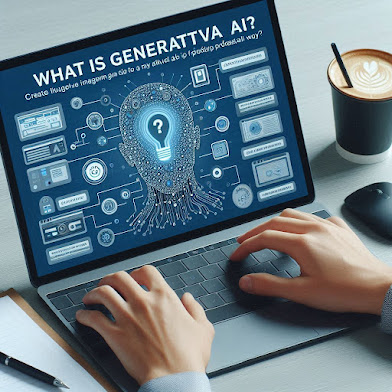What is Generative AI? - "Real-Life Examples and Benefits"
What is Generative AI? - "Real-Life Examples and Benefits"
Generative AI, commonly
known as Gen AI, is changing the way we think about artificial intelligence.
This innovative technology allows machines to create content that looks and
feels like it was made by humans. Whether it’s writing text, designing images,
composing music, or producing videos, generative AI is making waves across
various fields.
Imagine having a tool that
can help you draft emails, create stunning visuals, or even compose a catchy
tune—all with just a few clicks. That’s the power of generative AI. It’s not
just for tech experts; it’s for everyone who wants to enhance their creativity
and productivity.
In this article, we’ll
break down what generative AI is, show you real-life examples of how it’s being
used, and discuss the benefits and challenges it brings. Whether you’re new to
the concept or looking to deepen your understanding, this guide will provide
you with a clear and engaging overview of generative AI and its impact on our
world.
Understanding Generative AI with Real-Life Examples
To grasp the concept of
generative AI, let’s look at some real-life examples:
Text Generation: Tools
like OpenAI’s ChatGPT can write essays, generate creative stories, and even
draft emails. For instance, if you provide a prompt like “Write a story about a
brave knight,” the AI can generate a complete narrative based on that input.
Image Creation:
Applications like DALL-E can create unique images from textual descriptions.
For example, if you describe “a cat wearing a space suit,” the AI can generate
an image that matches this description.
Music Composition:
AI models like Jukedeck can compose original music tracks. Musicians and
content creators use these tools to generate background scores for videos or
even entire songs.
Video Generation:
Platforms like Synthesia use generative AI to create videos with virtual
presenters. This is particularly useful for creating training videos or
marketing content without needing a human actor.
Benefits of Generative AI
Generative AI offers
numerous benefits across various fields:
Creativity and Innovation: It enhances creativity by providing new ways to
generate content. Artists, writers, and designers can use AI to brainstorm
ideas and create unique works.
Efficiency:
Generative AI can automate repetitive tasks, such as drafting emails or
creating marketing materials, saving time and resources.
Personalization:
Businesses can use generative AI to create personalized content for their
customers, improving engagement and satisfaction. For example, AI can generate
personalized product recommendations or custom marketing messages.
Accessibility:
It makes content creation accessible to those who may not have specialized
skills. For instance, someone without graphic design experience can create
professional-quality images using AI tools.
Challenges of Generative AI
Despite its benefits,
generative AI also presents several challenges:
Quality Control:
Ensuring the quality and accuracy of AI-generated content can be difficult. AI
might produce content that is factually incorrect or lacks coherence.
Ethical Concerns: There are ethical issues related to generative AI, such as the potential for creating deep fakes or generating misleading information. This raises questions about the responsible use of AI.
Bias:
AI models can inherit biases present in the data they are trained on, leading
to biased or unfair outputs. Addressing these biases is crucial to ensure fair
and equitable AI applications.
Intellectual Property: Using AI to generate content raises questions
about copyright and intellectual property. Who owns the rights to AI-generated
works? This is an ongoing debate in the legal and creative communities.
Conclusion
Generative AI is a
powerful tool that is transforming the way we create and interact with content.
From writing and art to music and video, its applications are vast and varied.
While it offers significant benefits in terms of creativity, efficiency, and
personalization, it also poses challenges that need to be addressed. As we
continue to explore the potential of generative AI, it is essential to consider
both its advantages and the ethical implications of its use.
By understanding generative AI and its impact, we can better navigate the opportunities and challenges it presents, ensuring that this technology is used responsibly and effectively to benefit society. for further study and more examples, you can join online course "AI for Everyone from Beginner to Pro" from www.A1Skills.Com






Very good information related to Gen AI..
ReplyDeleteThanks for your comments it will motivate us.
Delete